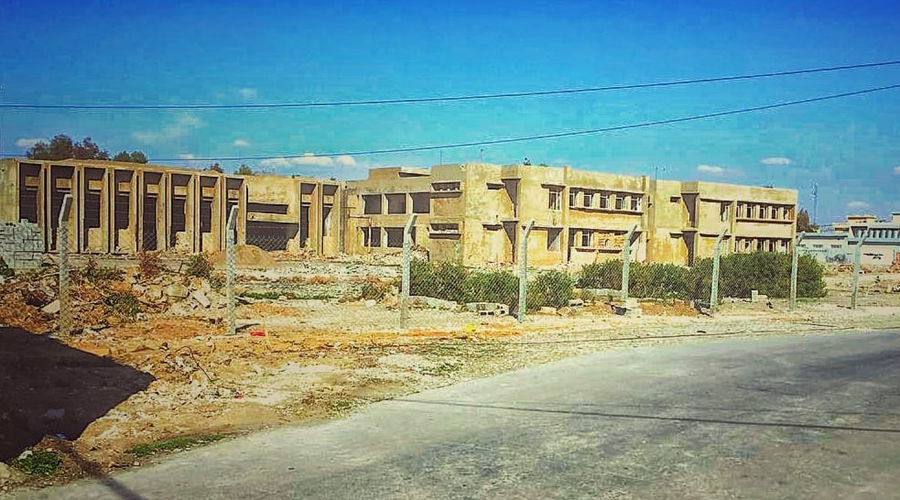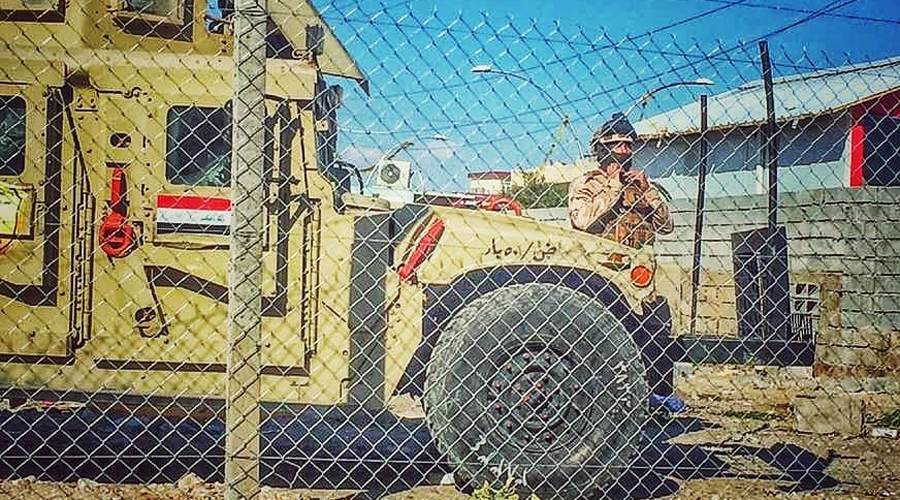The Joint Operations Command in Kirkuk has deployed a military force and Hummers inside an old headquarters dating back to the rule of the Baath regime, located in the middle of residential neighborhoods.
The headquarters was built on an area of three acres and became a shelter for displaced families after the fall of the Baath regime in 2003, but it was emptied of its residents five years ago. A few weeks ago, the army surrounded the headquarters located in Al-Hisabat neighborhood at the center of Kirkuk by a fence and there are currently forces and Humvee military vehicles in it.
Residents of Al-Hisabat neighborhood, predominantly Kurd, are unpleased with a military base in the middle of neighborhood.
Zaher Fattah, a resident of the neighborhood, said, "The army has deployed a military force and is in the process of renovating the building to use it again. It is not permissible for military forces to be present continuously inside a residential neighborhood.”
“Deploying troops in that building caused us panic and fear,” Fattah added.
"I am sixty years old, except for the period of the Iraq and America war (Gulf war 1991), I have never encountered a military headquarters in the midst of alleys and neighborhoods."
Currently, Iraqi army, local and federal police, Brigade 61 of Special Forces along with Shiite paramilitary of Popular Mobilization Forces PMF, are under Kirkuk joint operations’ command, an umbrella for the security forces running the security of Kirkuk province.
The oil rich city of Kirkuk, Iraq's second largest oil reserves, is ethnically a mixed province of 1.7 million Kurds, Sunni and Shiite Arabs, and Turkmens. It has long been at the center of disputes between the federal government in Baghdad and the autonomous Kurdistan Regional Government KRG.
that made us uncomfortable
Kirkuk, 238 kilometers north of Baghdad, is the center of the disputed territories of Iraq that runs from Shingal in Nineveh province on the Syrian border southeast to Khanaqin and Mandali on the Iranian border.
Salma Abdullah, who owns a small shop near the headquarters building, says, "We have a question about the reason for converting that building into a camp. These forces were supposed to be outside the city of Kirkuk. Their presence here is a cause for concern. Some soldiers came several times and asked us for shovels to work. It was inside the building, but I refused and told them we don't have shovels," Salma added
"It is not logical that we women could not go out because of the presence of this camp, that made us uncomfortable."

Kirkuk, February 2022: The deployment of an Iraqi army force inside a building dating back to the rule of the Baath regime in Al-Hisabat neighborhood. KirkukNow
This development coincides with the installation of temporary checkpoints and extra security forces dontown of Kirkuk. These points were initially managed by the Joint Operations Command before being handed over to the local police.
Last Thursday, February 10, Kirkuk police announced the arrest of 100 people per various charges by those temporary checkpoints.
Regarding the use of the Al-Hisabat neighborhood building, Kirkuk police spokesman Amer Nuri told KirkukNow on Thursday, February 17, "This case has nothing to do with the Kirkuk police, but rather the army."
Concerning the temporary checkpoints, Amer Nouri said, "The search and sweep campaigns inside neighborhoods fall within the framework of a security plan directly supervised by the Joint Operations Command, and the aim is to arrest suspects and wanted persons."
the army deployed part of its forces there in order to play the role of backup forces for the local and federal police
Last week, the security forces have deployed security checkpoints and controls in a number of areas of the city of Kirkuk, after receiving intelligence information with the intention of armed groups to target Kirkuk detention prison (Tasfirat), according to the spokesman for Kirkuk Police Command.
A source in the Joint Operations Command in Kirkuk told KirkukNow, "The army has been deployed in some areas to support the security forces to enforce the rule of law, within the framework of plans to enhance Kirkuk's security, where the security forces were able to arrest more than 110 wanted on various charges including terror charges.”
Regarding the deployment of the army in the northern neighborhoods of Kirkuk, the source, who preferred to stay anonymous, said, "These forces were originally present in Kirkuk, but they have less headquarters north of the city, so the army deployed part of its forces there in order to play the role of backup forces for the local and federal police conducting security operations against Daesh.”
The source stressed that the army headquarters are located in the southern neighborhoods, majority Arabs, as well, and that all forces are undertaking the task of enhancing security in Kirkuk within the framework of the Joint Operations Command.
"The security situation in Kirkuk is stable and there is no security threat to any government agency," according to the source.
Below are more photos of the security forces that set up temporary checkpoints inside the city of Kirkuk.








